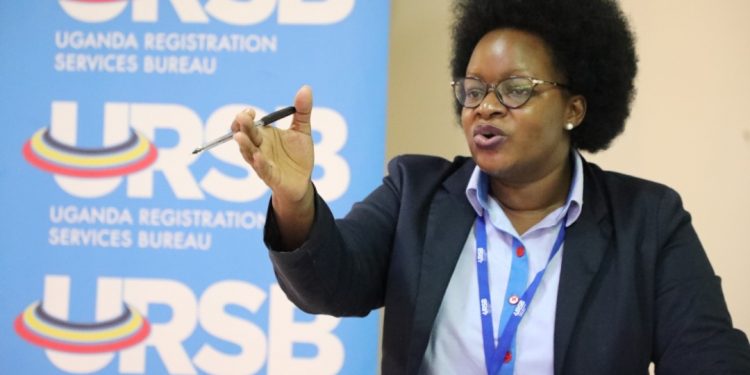Uganda’s national Intellectual property office, the Uganda Registration Services Bureau (URSB) has this afternoon concluded a two-day virtual training on intellectual property (IP) and mechanisms for dealing with trademark counterfeiting and copyright piracy for police officers undertaking the Senior Command Course, at the Police Senior Command and Staff College, Bwebajja. The training was organized to present measures to law enforcers on how they can ensure that intellectual property rights are well-protected thereby encouraging Ugandan companies, in particular small, medium enterprises (SMEs) and start-ups to invest in innovation and creativity without the fear of their ideas being duplicated.
According to the World Intellectual Property Organization (WIPO), intellectual property refers to ‘creations of the mind: inventions, literary and artistic works, and symbols, names, images, and designs used in commerce. IP is divided into two categories: Industrial property, which includes inventions (patents), trademarks, industrial designs, and geographic indications of source; and copyright, which includes literary and artistic works such as novels, poems and plays, films, musical works, artistic works such as drawings, paintings, photographs and sculptures, and architectural designs. Rights related to copyright include those of performing artists in their performances, producers of phonograms in their recordings, and those of broadcasters in their radio and television programs’
Commissioner of Police, Moses Kafeero who is also the Commandant of the College said the training was timely since it would make it easier for the police officers to act efficiently against breaches of intellectual property rights, facilitate easier litigation and tackle the distribution and sale of counterfeited or pirated products.
‘We thank URSB for offering us the opportunity to learn more about how we can efficiently combat IP infringements. We are now better prepared to act faster against counterfeiting and piracy. We can now reliably compliment all efforts targeted towards IP rights enforcement while stepping up action on infringement’ CP Kafeero said
The Registrar General, Mercy Kainobwhisho said the training was in-line with Government’s National Intellectual Property Policy that gave priority to the protection and commercialization of intellectual property as part of growing the creative sectors of the economy.
‘Uganda’s economic growth and competitiveness largely depends on the many entrepreneurs, from the start-ups to large companies who are continuously investing in new ideas and knowledge. We believe training a reliable team that is capable of enforcing intellectual property rights will encourage investment and boost our collective ability to protect and counter fake goods and pirated content which harm our companies and jobs by denying them revenues from their inventions’ She said
‘We want to grant everyone a fair and balanced reward for their innovations while allowing others to build on this to protection to generate new innovative products and services’ Kainobwisho added
The training comes on the heels of efforts by URSB and other stakeholders to step up the fight against counterfeiting and piracy while working towards depriving commercial-scale IP infringers of gains that make their criminal activity lucrative.
Training participants were taken through the various measures to encourage the fight against IP infringements, reduce the volume of counterfeited products and ensuring high-level legal protection for intellectual property owners. The training also tackled enhancement of compliance and practical functioning of IP usage, increase of legal certainty for all stakeholders in the IP ecosystem while facilitating enforcement, facilitating industry-led initiatives and reinforcing cooperation programmes that support IP protection across board, plus general aspects of IP and complaint handling and enforcement.
The Registrar General made a generous donation of copies of compendium of laws to all participants to aid their grasp of legal knowledge needed for easier enforcement of IP rights





